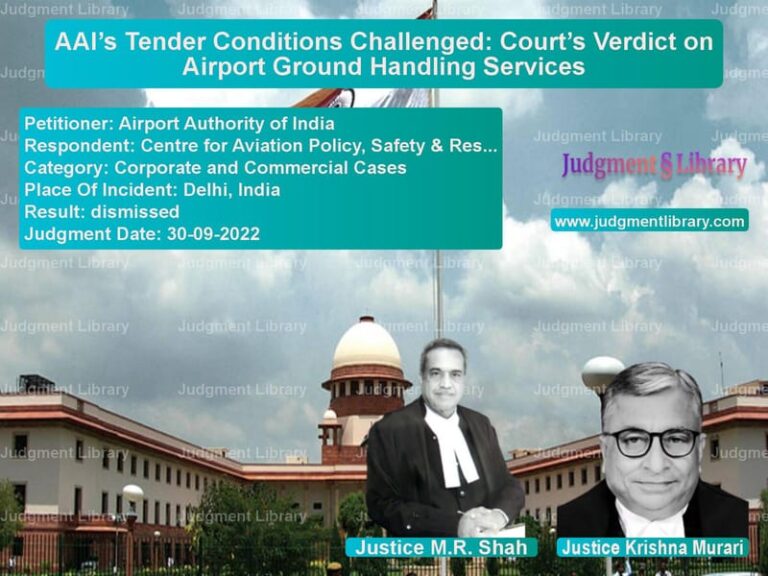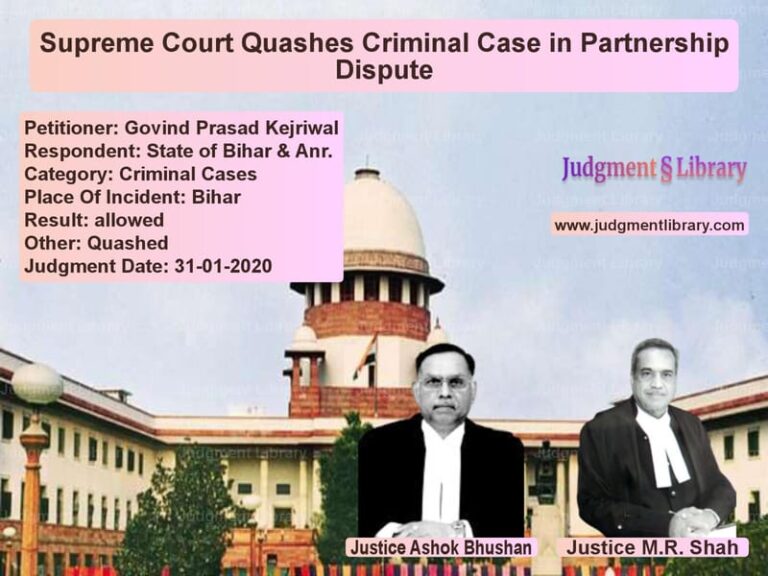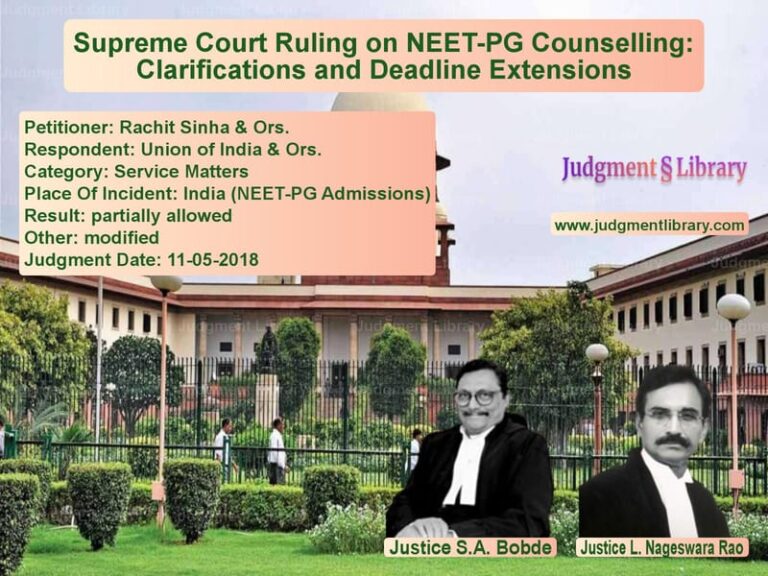Supreme Court Rules on Arbitration Award Modification Under National Highways Act
The Supreme Court of India, in the case of The Project Director, National Highways Authority of India v. M. Hakeem & Anr., ruled on the question of whether courts have the power to modify arbitral awards under Section 34 of the Arbitration and Conciliation Act, 1996. This case sets a crucial precedent regarding judicial intervention in arbitration and impacts infrastructure projects, particularly those involving land acquisition under the National Highways Act, 1956.
Background of the Case
The dispute arose when landowners challenged the compensation awarded for land acquisition under the National Highways Act, 1956. The National Highways Authority of India (NHAI) had acquired land for infrastructure projects and provided compensation based on statutory criteria. However, the landowners contested that the compensation was significantly lower than the prevailing market value, thereby causing financial hardship.
The dispute was referred to arbitration, and an arbitral tribunal awarded an enhanced compensation to the landowners. Dissatisfied with the increase, NHAI challenged the award under Section 34 of the Arbitration and Conciliation Act, seeking a modification or reduction of the enhanced compensation. The High Court, while partially allowing NHAI’s appeal, modified the award by reducing the enhanced compensation.
Legal Issues Before the Court
- Whether courts have the power to modify an arbitral award under Section 34 of the Arbitration and Conciliation Act, 1996.
- The extent of judicial intervention permissible in arbitral proceedings.
- The balance between protecting landowners’ rights and ensuring timely infrastructure development.
Petitioner’s Arguments (NHAI)
The Project Director, NHAI, argued that:
- Section 34 of the Arbitration and Conciliation Act only permits courts to set aside an arbitral award, not to modify it.
- The enhanced compensation granted by the arbitral tribunal was arbitrary and beyond statutory provisions.
- Judicial intervention was necessary to ensure that compensation remained fair and aligned with legislative intent.
- Allowing modification of arbitral awards would help correct errors without requiring fresh arbitration.
Respondents’ Arguments (Landowners)
The landowners contended that:
- The compensation initially provided was unjust and far below the market value.
- The arbitral tribunal had appropriately exercised its discretion to correct the injustice.
- Any reduction in the awarded amount would violate their right to fair compensation under the law.
- The High Court’s intervention in modifying the award undermined the autonomy of arbitration.
Supreme Court’s Observations
The Supreme Court analyzed the legal framework surrounding arbitration and judicial intervention. The Court held:
“Section 34 does not empower courts to modify an arbitral award. The provision only permits setting aside an award on limited grounds, including procedural irregularities and violations of public policy. Allowing courts to modify awards would go beyond the legislative intent and erode the finality of arbitration.”
The judgment emphasized:
- Arbitration is intended to be a final and binding dispute resolution mechanism.
- Judicial intervention must be minimal to preserve the efficiency and credibility of arbitration.
- Section 34 is limited to setting aside awards and does not include powers of modification.
- Modifying an award would amount to judicial re-evaluation of the dispute, which contradicts the Arbitration Act’s objective.
Key Precedents Cited
- ONGC v. Saw Pipes Ltd. – Discussed judicial review of arbitral awards but did not endorse modification.
- Associate Builders v. DDA – Highlighted grounds for setting aside arbitral awards.
- MMTC Ltd. v. Vedanta Ltd. – Reinforced limited judicial intervention in arbitration.
Final Judgment
The Supreme Court ruled that the High Court erred in modifying the arbitral award. The modification was beyond the powers granted under Section 34 of the Arbitration and Conciliation Act. The Court reinstated the arbitral tribunal’s award, reaffirming that courts must refrain from altering awards unless they are legally unsustainable.
Impact of the Judgment
The ruling has significant implications for arbitration in India:
- Strengthening Arbitration Autonomy: The judgment reinforces the finality of arbitral awards, preventing excessive judicial interference.
- Guidance for Infrastructure Disputes: It clarifies that land acquisition disputes must adhere to statutory compensation frameworks without excessive judicial modification.
- Limited Scope for Award Corrections: The ruling ensures that courts do not assume the role of arbitrators.
Conclusion
The Supreme Court’s decision in The Project Director, National Highways Authority of India v. M. Hakeem & Anr. sets a crucial precedent for arbitration law. By ruling that courts lack the power to modify arbitral awards, the judgment upholds the integrity of arbitration as a dispute resolution mechanism. This case underscores the importance of respecting arbitration’s finality while ensuring justice for affected landowners.
Petitioner Name: The Project Director, National Highways Authority of India.Respondent Name: M. Hakeem & Anr..Judgment By: Justice R. F. Nariman, Justice B. R. Gavai.Place Of Incident: India.Judgment Date: 20-07-2021.
Don’t miss out on the full details! Download the complete judgment in PDF format below and gain valuable insights instantly!
Download Judgment: the-project-director-vs-m.-hakeem-&-anr.-supreme-court-of-india-judgment-dated-20-07-2021.pdf
Directly Download Judgment: Directly download this Judgment
See all petitions in Arbitration Act
See all petitions in Dispute Resolution Mechanisms
See all petitions in Enforcement of Awards
See all petitions in Settlement Agreements
See all petitions in Institutional Arbitration
See all petitions in Judgment by Rohinton Fali Nariman
See all petitions in Judgment by B R Gavai
See all petitions in dismissed
See all petitions in supreme court of India judgments July 2021
See all petitions in 2021 judgments
See all posts in Arbitration and Alternate Dispute Resolution Category
See all allowed petitions in Arbitration and Alternate Dispute Resolution Category
See all Dismissed petitions in Arbitration and Alternate Dispute Resolution Category
See all partially allowed petitions in Arbitration and Alternate Dispute Resolution Category







